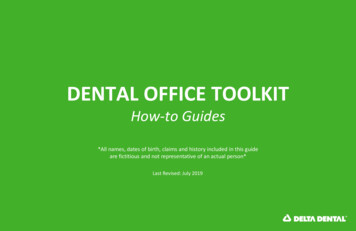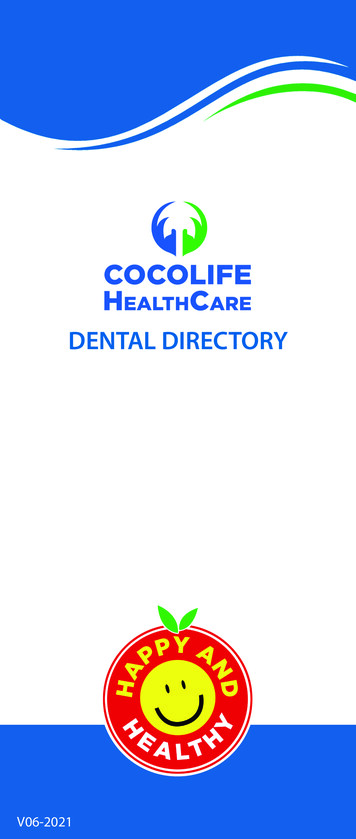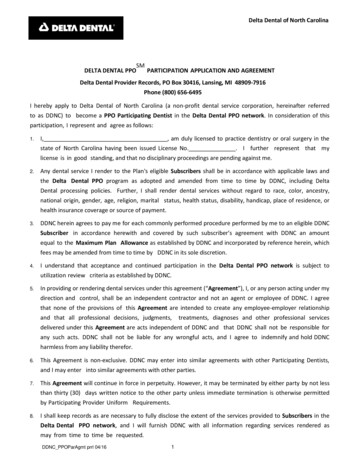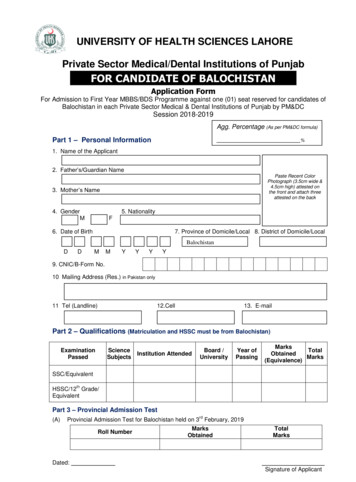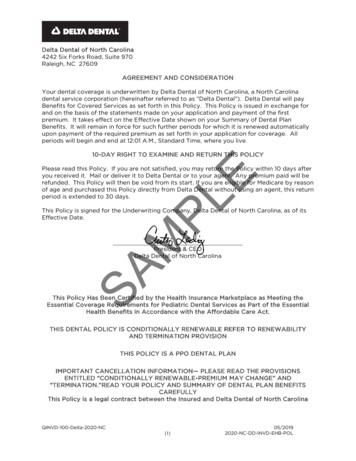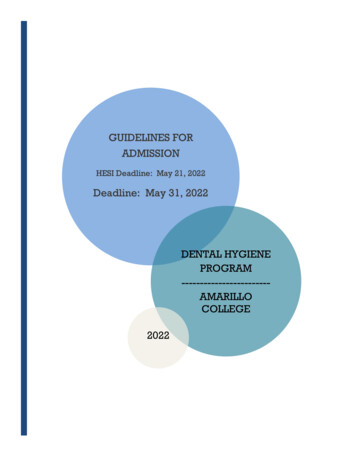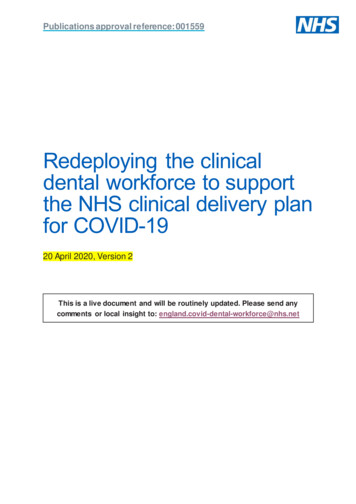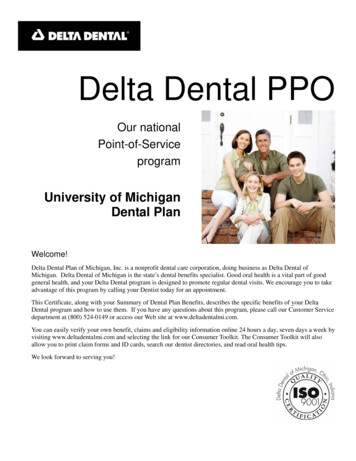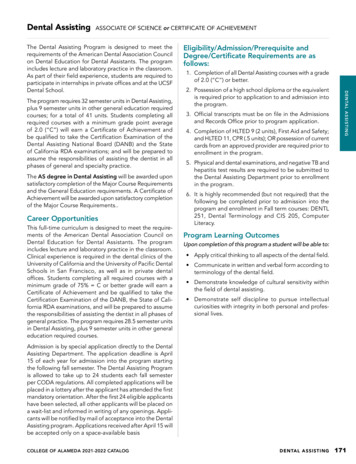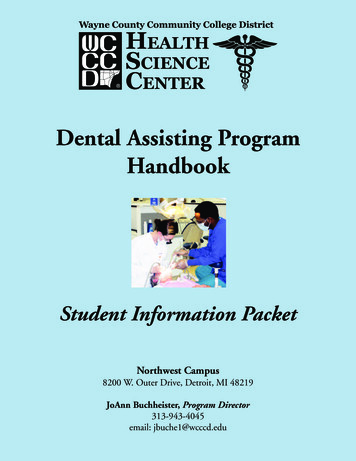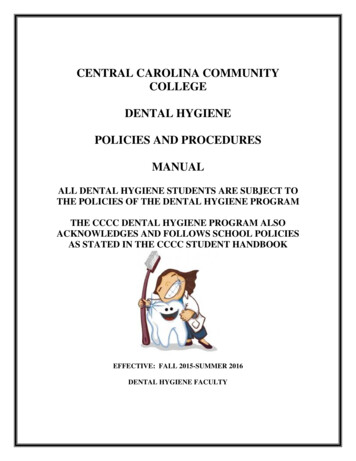
Transcription
CENTRAL CAROLINA COMMUNITYCOLLEGEDENTAL HYGIENEPOLICIES AND PROCEDURESMANUALALL DENTAL HYGIENE STUDENTS ARE SUBJECT TOTHE POLICIES OF THE DENTAL HYGIENE PROGRAMTHE CCCC DENTAL HYGIENE PROGRAM ALSOACKNOWLEDGES AND FOLLOWS SCHOOL POLICIESAS STATED IN THE CCCC STUDENT HANDBOOKEFFECTIVE: FALL 2015-SUMMER 2016DENTAL HYGIENE FACULTY
Vicky Wesner, CDA, RDH, MEdDental Programs DirectorWB Wicker Suite 220B, Room B1919-777-7782vwesn556@cccc.eduJessica Scott, CDA, RDH, MSDepartment Chair, Allied Health/1st Year Dental Hygiene Instructor/Clinic CoordinatorWB Wicker Suite 220B, Room B2919-777-7781jpeek251@cccc.eduWhitney Simonian, RDH, MS2nd Year Dental Hygiene Instructor/Clinic CoordinatorWB Wicker Suite 220B, Room B6919-777-7727wsimo432@cccc.eduFernanda Perry, DDSDental Assisting Program Instructor/CoordinatorWB Wicker Suite 220B, Room B3919-777-7783fperry451@cccc.eduDr. Lee Templeton, DDSDental Programs DentistWB Wicker Suite 220B919-777-7791ltempleton@cccc.eduDENTAL DEPARTMENT SUPPORT STAFFTerri McKoneDental Programs Office ManagerWB Wicker Suite 220B919-777-7780FAX # 919-777-7788tmcko609@cccc.edu2
TABLE OF CONTENTSWELCOME TO THE DENTAL HYGIENE PROGRAM6CCCC AND DEPARTMENT PURPOSE STATEMENT AND PHILOSOPHIESCCCC Mission StatementDental Program Mission StatementDental Hygiene PhilosophyProgram Goals7777THE PROFESSION: DENTAL HYGIENE INFORMATIONFacts About Dental HygienistsEssential Dental Hygiene FunctionsCCCC Dental Hygiene Program Competency StatementCore CompetenciesAwards/End-of-Program Pinning CeremonyComplaints PolicyThird Party Comments891010141516DENTAL HYGIENE PROGRAM: GENERAL INFORMATIONAttendance PolicyPreparation for Class/ClinicBlackboardBreakroom AreaCellular Phones/PagersClinic Equipment UseClinic/Laboratory AccessCommunity Experiences/Volunteer WorkComputer LabCopiers/Printing/CopiesCounseling and AdvisorsDisability StatementDisability/Special Populations OfficeFiling Change of Address/Name ChangesFinancial AidLibrary/Learning Resource CenterMailboxesMalpractice InsuranceParkingReceptionSmokingStudent ActivitiesStudent ServicesTelephone MessagesTelephone UseWorking StudentsETHICS AND PATIENT CONFIDENTIALITYHIPAA RequirementsDENTAL HYGIENE PROGRAM: 22222223232323243
Entrance Into the ProgramGrade Point Average; EntranceAttendance at Info Session/New Student OrientationTransfer/Audit of CoursesAdvanced PlacementTraining Procedures; Student RequirementsNon-Discrimination in Patient TreatmentVaccines/Health CarePregnancyCardiopulmonary Resuscitation RequirementsDENTAL HYGIENE PROGRAM REQUIREMENTS: LAB AND PRECLINIC/CLINICALAPPEARANCEGeneral Expectations of Dental Hygiene StudentsLaboratory and Pre-Clinic Attire (No Patient Care)Clinic Attire (Patient Care)Guest Speaker/Field Trip AttireBody AdornmentsJewelryPersonal CareBehavior/LanguageMiscellaneousProfessional DecorumDental Hygiene Technical StandardsMental/Physical/Emotional HealthPhysical and Emotional StabilityAlcohol/Drug Use or AbuseHonesty PolicySecond Opinions/Additional InputGRADE POLICIES: DENTAL HYGIENE PROGRAMCurriculum Grade Requirements to Successfully Advance Toward GraduationDental ClassesBiology/Chemistry ClassesGeneral Education/HumanitiesCourse PromotionWithdrawalDismissalAdvance StandingRe-Admission to CurriculumRemediation Policy for ClinicDISCIPLINARY PROCEDURES/POLICIES-DENTAL HYGIENECritical Error Policy for Clinic/LabsNon-Cumulative Critical ErrorsCumulative Critical ErrorsPenalties for Critical Errors of Clinical TrainingGrounds for DismissalStudent Appeals ProcessSTUDENT RESPONSIBILITIESStudent ResponsibilitiesProgram Philosophy Regarding Student ResponsibilitiesLICENSURE INFORMATIONNational BoardRegional Board-CITANC State 33434353535363636363737383940404041434343444646464
Additional State/Regional BoardsFelony Convictions/Moral TurpitudeEMERGENCY/SAFETYEmergency Safety Procedures PlanRelaying of InformationFire and Smoke SafetyEmergency Phone Numbers/Fire Emergency EquipmentBomb ThreatEvacuation ProceduresSevere Inclement WeatherCivil DisturbancesLock Down ProceduresEVACUATION ROUTESClinicRadiologySimulation Laboratory/ClassroomClinic Layout and OrganizationMEDICAL EMERGENCIES & ACCIDENTSSerious Injuries/Medical Emergencies (General Locations)Serious Injuries/Medical Emergencies (Clinical Setting)AccidentsBlood-Borne IncidentsForeign Object PolicyEmergency Equipment LocationEvaluation of Emergency InventoryEyewash StationAMERICAN DENTAL HYGIENIST’S ASSOCIATIONPATIENT BILL OF RIGHTSDISCLAIMER STATEMENTCHALLENGECONFIRMATION OF 960606161626264655
WELCOME! TO THE DENTAL HYGIENECLASS OF 2017This orientation manual has been prepared to help orient you to the CCCC Dental HygieneProgram. The rules, policies, and procedures recorded in this manual* will guide you through thenext two years of your educational career.Please keep this manual at your finger tips at all times. Students are expected to exercise goodcritical thinking skills and show responsibility by being knowledgeable of and compliant with allpolicies contained within this manual – whether they pertain to the classroom, lab, clinic, orclinical rotation sites.The CCCC Student Handbook and other school publications will also serve as guidelines of yourprofessional behavior and student responsibilities as you attend classes on campus and at satellitecampus/rotation sites. Dental Hygiene students are advised, however, (as permitted by the schooladministration) that their course syllabi and Orientation Manual may reflect more exactingpolicies than what is stated in the CCCC Handbook. These areas are indicated in both the manualand the school catalog.The faculty and staff of the CCCC Dental Hygiene Program wish you much success in yourstudies. Through your acceptance into the program, you have just accomplished the firstmilestone towards earning an Associate Degree of Applied Science and the credentials associatedwith this most rewarding career -----Dental Hygiene!! We hope that you will always rememberthe pride and happiness you feel now for accomplishing this first step.Again, congratulations for being selected to the Dental Hygiene Class of 2017!*The policies/rules contained within this manual are not all inclusive; additional information will berelayed in class as necessary. Policies are subject to change with notice.6
CCCC MISSION STATEMENTCentral Carolina Community College serves as a catalyst for individual, community, andeconomic development by empowerment through accessible lifelong learning.DENTAL PROGRAM MISSION STATEMENTCentral Carolina Community College Dental Program is committed to establish and maintainquality staff, faculty, and facilities necessary to educate and train competent dental assistantsand hygienists to serve the oral health care needs of the citizens of our state, while achievingthe educational goals of our students.DENTAL HYGIENE PHILOSOPHYThe Philosophy of the Dental Hygiene Program is to provide an educational environment inwhich students can learn, be challenged and prepare for a role in the modern practice of dentistry.The Dental Hygiene Program embraces the concept of a team approach to the delivery of dentalpatient care.PROGRAM GOALSTo provide dental hygiene education and leadership by using a team approach.To maintain the recruitment and retention of dental hygiene students by creating aquality professional academic environment.To foster diverse participation in and matriculation through the Dental Hygieneprogram.To continue to meet the needs of our community and state by graduating competentdental hygienists.To prepare the dental hygiene student to perform all aspects of dental hygienetreatment under the direction and supervision of licensed hygienists and dentists.To develop graduates to use an evidence-base approach to dental hygiene.To develop graduates who possess the skills and knowledge to competently, legallyand ethically plan, implement and evaluate dental hygiene services.To develop graduates who possess the ability to assess their own work and activelyplan for continuous growth.To encourage participation in professional associations for the advancement of dentalhygiene promotion of oral health.To foster an attitude of lifelong learning and scientific inquiry.7
To foster a commitment to community services.To prepare graduates in dental hygiene to deliver patient care with a scientific basisand caring manner.To instill a professional and societal responsibility in all students that will preparethem to become community leaders and address the public need.To prepare the student to pass the Dental Hygiene National Board and State Boardclinical exams.THE PROFESSION: DENTAL HYGIENE INFORMATIONFACTS ABOUT DENTAL HYGIENISTSA dental hygienist is a preventive oral health professional licensed in dental hygienewho provides educational, clinical and therapeutic services supporting total healththrough the promotion of optimal oral health.The education of the dental hygienist emphasizes the basic sciences, which includemicrobiology, chemistry, pathology, anatomy, and physiology. Other components ofthe curriculum develop the clinical skills of the dental hygienist, which ultimatelyprepares the hygienists to provide preventive dental health program accredited by theAmerican Dental Association on Dental Accreditation and upon successfulcompletion of both a written National Board Dental Hygiene Examination andclinical State Examination. The licensed dental hygienist practices in accordancewith the requirements of individual state dental practice acts. The purpose oflicensure is to protect the public. In many states, a dental hygienist must takecontinuing education courses to renew his/her license.A dental hygienist may work in such practice settings as:o Private dental offices and dental clinicso Federal, state and local health departments or associated institutionso Hospitals and nursing homeso School districts or departments of educationo Educational programs for dental, dental hygiene and dental assistingstudentso Private business/industryo Correctional facilitieso Private and public centers for pediatric, geriatric and otherindividuals/groups with special needso Health Maintenance OrganizationsA dental hygienist is that member of the dental team who is responsible for providingtreatment that helps to prevent oral disease such as dental caries (cavities) andperiodontal disease (gum disease) and for education of the patient to maintainoptimal oral health. This professional is especially knowledgeable about thepreventive aspects of dental disease.8
Although legal dental hygiene functions vary from state to state, some of thefunctions routinely performed by a dental hygienist include, but are not limited to:o Monitoring of patient’s health history, including blood pressureo Thorough examination of the teeth and oral structures, including a softtissue examo Removal of calculus, stain, and plaque (hard and soft deposits) from aboveooooooooand below the gum-lineApplication of caries-preventive agents, such as fluorides and pit andfissure sealantsPlaque control instruction and development of individualized oral hygieneprograms for home careDietary analysis and counselingExposure, processing and interpretations of dental x-raysPlacement of temporary fillings and periodontal dressings, removal ofsutures, and polishing and re-contouring amalgam fillingsEducating the individual patient, the general public and special populationgroups (e.g., minority groups, geriatric, mentally/physically handicappedpersons) about the importance of good oral hygiene habitsOral cancer and blood pressure screeningsDesigning and implementing community dental health programsIn some states, with additional education, a hygienist may provide other services suchas administering local anesthetics and nitrous oxide/oxygen analgesia, placing andcarving of filling materials, and also additional periodontal procedures.(Prepared by the ADHA Council on Dental Hygiene Practice)ESSENTIAL DENTAL HYGIENE FUNCTIONSTo successfully complete the clinical component of the Program, the student must be able toperform all of the essential functions of a dental hygienist:Protect the best interest of the patient, the profession, and the public.Communicate satisfactorily with patients, physicians, peers, family members, andthe health care team, regarding: Referrals. Oral hygiene instructions. Community activities.Possess the visual acuity to: Note slight changes in the patient’s condition. Correctly read handwritten orders, medication records, and chart contents. Accurately and safely instrument in the oral cavity. Distinguish slight changes in contour of working ends of instruments.Hear adequately to: Note slight changes in the patient’s condition. Perceive and interpret various equipment signals.9
Use hands for fine manipulation.Demonstrate adequate eye/hand coordination for dexterity in manipulation of handinstruments and other equipment used in clinical practice.Manage the care of a patient in a sudden emergency, including one-man CPR whennecessary.Exercise good judgment, using the ADHA Code of Ethics as a guide in decisionmaking.CENTRAL CAROLINA COMMUNITY COLLEGEDENTAL HYGIENE PROGRAMCOMPETENCIES FOR THE ASSOCIATE OF APPLIED SCIENCEDENTAL HYGIENE PROGRAM GRADUATEINTRODUCTIONThese competencies identify the knowledge; skills, behaviors, and attitudes graduates of theCCCC Dental Hygiene Program are expected to achieve to enter dental hygiene practice. Thisdocument is designed to direct the educational process and serves as a basis for curriculumdevelopment, review, and outcomes assessment; and for guiding the selection of course content,sequencing, and learning activities across the curriculum. Faculty and student input provide amechanism for periodic review and refining of the competencies.The competencies are categorized into five domains that represent the focus of the curriculum:Core Competencies, Health Promotion & Disease Prevention, Community Involvement,Patient/Client Care, and Professional Growth and Development. Supporting behaviors and skillsare reflected in individual course syllabi. Goals, objectives, and assignments in individualcourses within the curriculum elaborate the specific mechanisms and learning experiences bywhich students develop and demonstrate the competencies, and are reflected in course outlines.CORE COMPETENCIESTHE DENTAL HYGIENE GRADUATE MUST BE ABLE TO:1. Practice ethically and professionally dental hygiene services that are legally delegated inthe state of North Carolina.2. Assess, plan, implement and evaluate comprehensive dental hygiene care for individualsat a variety of levels of periodontal health.3. Ensure the privacy of the patient during all aspects of dental hygiene treatment includingthe confidentiality of patient records.10
4. Serve all patients and the community without discrimination, appreciating the culturaldifferences of the population.5. Initiate and assume responsibility for health promotion and disease prevention activitiesfor diverse community-based populations through assessment, planning, implementationand evaluation.6. Pursue academic and professional excellence as life-long learners, incorporating futurechanges in scientific and technical knowledge to augment the changing needs of society.HEALTH PROMOTION/DISEASE PREVENTIONTHE DENTAL HYGIENE GRADUATE MUST BE ABLE TO:1. Promote prevention-oriented health care to a multi-cultural and multi-age clientpopulation.Supporting Behaviors and Skills:a. Be an advocate for healthy lifestyles and take an activist role in diseaseprevention and health-promotion strategies.b. Provide comprehensive cross-cultural dental hygiene health care to patients orclients with respect for their goals, values, beliefs, and preferences.2. Identify risk factors in clients and community populations and promote oral selfcare and healthy lifestyles through positive interventions.Supporting Behaviors and Skills:a. Recognize indications for possible referral of patients/clients for physiological,psychological, and/or social evaluations to ensure comprehensive treatment.b. Use the principles of learning, current knowledge, and interpersonal skills toenhance behavior modification in patients/clients who exhibit modifiable riskfactors and behaviors.3. Apply the principles of infection control and environmental safety to dental hygienecare delivery.Supporting Behaviors and Skills:a. Know the benefits and limitations of client assessments in identifying potentialsources of infection.b. Recognize the ethical obligations to follow standards of care in regards toinfection control protocols and environmental safety, consistent with currentfederal, state, and local guidelines.c. Utilize ergonomic principles of instrumentation and operation which protect thehealth and safety of the client and the clinician during the delivery of dentalhygiene care.11
COMMUNITY INVOLVEMENTTHE DENTAL HYGIENE GRADUATE MUST BE ABLE TO:1. Assess the oral health needs of a diverse community and the quality and availability ofresources and services.2. Provide screening, referral, and educational services that allow clients access to theresources of the health care system.3. Provide community oral health services and preventive counseling to diverse populationgroups.4. Collaborate with decision makers and community organizations to increase client accessto oral health care delivery.5. Evaluate reimbursement mechanisms and their impact on the client’s access to oral healthcare.6. Evaluate the outcomes of community-based programs and plan for future activities.PATIENT/CLIENT CARETHE DENTAL HYGIENE GRADUATE MUST BE ABLE TO:ASSESSMENT1. Systemically collect, analyze and record data on the general, oral and psycho-socialhealth status of a variety of patients/clients using methods consistent with medicolegal principles.Supporting Behaviors and Skills:a. Recognize the appropriate diagnostic information to select, obtain, and interpret.b. Recognize predisposing and etiologic factors and the appropriate protocol forintervention or referral.c. Obtain, review, and update a complete medical, family, social, and dental history.d. Recognize health conditions and medications that affect client care.e. Identify clients at risk for a medical emergency and provide management carethat prevents and manages such an emergency.f. Perform comprehensive extra-oral and intra-oral examinations, using allappropriate data collection procedures to assess the client’s needs.g. Provide diagnostic quality radiographs to ensure accurate assessment andappropriate treatment.DIAGNOSIS2. Use critical decision-making skills to reach conclusions about the patient’s/client’sdental hygiene needs on all available assessment data.Supporting Behaviors and Skills:a. Develop an individualized dental hygiene diagnosis based on the appropriateassessment data.b. Identify constraints to client care based on assessment findings and followthrough with appropriate consultations and/or referrals.12
PLANNING3. Collaborate with the patient/client, and/or other health professionals, to formulate acomprehensive dental hygiene plan that is patient/client-centered and based oncurrent scientific evidence.Supporting Behaviors and Skills:a. Identify oral problems, medical and risk factors, and evidence-basedmethodologies to address education and care for the client.b. Develop a prioritized and logically sequenced individualized care plan with theclient.c. Make appropriate referrals to other health care professionals to facilitatecomprehensive client care.d. Obtain informed consent from the client or legal guardian based on a thoroughcase presentation.IMPLEMENTATION4. Provide specialized treatment that includes preventive and therapeutic servicesdesigned to achieve and maintain oral health. Assist in achieving oral health goalsformulated in collaboration with the patient/client.Supporting Behaviors and Skills:a. Utilize accepted infection control procedures during all phases of client care.b. Educate clients to self-promote and maintain oral and general health throughpreventive and oral maintenance and control of modifiable risk factors andbehavior.c. Provide necessary and appropriate adjunctive services for comprehensive clientcare in the scope of the rules and regulations of the state of North Carolina.d. Provide life-support measures to manage medical emergencies should they arise.EVALUATION5. Evaluate the effectiveness of the implemented clinical, preventive, and educationalservices and modify as needed.Supporting Behaviors and Skills:a. Utilize appropriate measurement and assessment techniques to evaluate theoutcomes of client care.b. Evaluate client satisfaction with treatment received and results obtained.c. Provide appropriate follow-up treatment and/or referrals.d. Develop and maintain an appropriate client re-care program.PROFESSIONAL GROWTH AND DEVELOPMENTTHE DENTAL HYGIENE GRADUATE MUST BE ABLE TO:1. Explore alternative career options within healthcare, industry, education, and researchand evaluate the feasibility of pursuing dental hygiene opportunities in these settings.13
2. Develop management and problem-solving strategies to be used in non-traditional healthcare settings.3. Communicate and collaborate with professional and social organizations to accessavailable resources for health care endeavors.4. Critically evaluate current scientific and professional literature; maintain competence inchanges in health care through lifelong learning; and apply current knowledge to makeevidence-based decisions in the provision of oral health care delivery.AWARDS/END-OF-PROGRAM PINNING CEREMONYA pinning ceremony will take place at the end of the spring semester to honor graduating studentsand first-year students who are progressing to second-year level. All students enrolled in theprogram are requested to be in attendance. Additional information regarding the ceremony willbe discussed in class. The following awards will be presented during the ceremony:CCCC Table Clinic Award: This award is earned by the first-year students who present themost interesting, factually accurate, and current Table Clinic Presentations, as determined byguest judges.North Carolina Dental Hygiene Academy of Advanced Studies Student Award:For a number of years, the Academy has recognized graduating dental hygiene students across thestate. As selected by the faculty, this graduate will receive a helping hand in meeting requiredlicensure continuing education credits for the first year.Dr. Ray Tseng Community Dental Hygiene Award: This award is earned by a graduatingstudent who has given the most to the community through school programs and other areas ofvolunteerism. Candidates for this award must document their volunteerism/hours in theCommunity Dental Health Log, as indicated and prescribed by the Community Dental Healthcourse instructor. (See also: Community Experience-Volunteer Work).14
Highest GPA: The student with the highest grade point average at the end of their DentalHygiene education receives this award. This grade average includes all courses taken within thecurriculum.Hu-Friedy Golden Scaler Award: This plaque, provided by Hu-Friedy ManufacturingCompany, is awarded to the graduating student who, in the instructors’ opinion as well as clinicalgrade point average, has excelled in the mastery of clinical skills – not only in prophylaxis, butalso to extended therapy techniques – for the benefit of the patient.Colgate STAR Award:This award is given to the graduating dental hygiene student who shows excellence andcommitment to the hygiene profession by: Demonstrating true dedication to the profession Exhibiting extraordinary compassion in patient careDisplaying enthusiasm and follow-through for community serviceDemonstrating outstanding patient education and motivation skillsSigma Phi Alpha, Delta Delta Psi chapter:Students in the final academic term of a dental hygiene program who rank highest in scholarship,service and leadership and exhibit potential qualities for future growth and attainment asrecommended by the faculty members shall be elected to membership. This membership islimited to ten percent of each graduating class.Markie Thomas, RDH Leadership and Professionalism Award:This award is given to the student who displays a remarkable service and leadership attitude.This student is well rounded in all areas but also exhibits a team spirit approach in all courseworkthroughout the duration of the program.CENTRAL CAROLINA COMMUNITY COLLEGEDENTAL HYGIENE PROGRAMCOMPLAINTS POLICYI.Complaints regarding the program or program graduates should be firstaddressed to Ms. Vicky Wesner, Dental Programs Director, atvwesn556@cccc.edu, or 919-777-7782. Unresolved complaints or complaintsabout the Program Director should be directed Ms. Jessica Scott, DepartmentChair of Allied Health, at jpeek251@cccc.edu, or 919-777-7781. Unresolvedcomplaints or complaints about the Department Chair of Allied Health shouldbe directed to Ms. Lisa Baker, Dean of Health Sciences, at lbaker@cccc.edu,or 919-777-7784. All complaints will be documented, including the projectedoutcome, and kept on file at the program facility. A complaint against theprogram or regarding accreditation of these programs should be addressed tothe Commission on Dental Accreditation.II.The Commission on Dental Accreditation will review complaints that relate toa program’s compliance with accreditation standards. The Commission is15
interested in the sustained quality and continued improvement of dental anddental-related education programs but does not intervene on behalf ofindividuals or act as a court of appeal for individuals in matters of admission,appointment, promotion or dismissal of faculty, staff or students. Onlywritten signed complaints will be considered by the Commission; oral andunsigned complaints will not be considered. The Commission stronglyencourages attempts at informal or formal resolution through the program’s orsponsoring institution’s internal processes prior to initiating a formalcomplaint with the Commission. The Dental Assistant Program will maintaina record of student complaints related to the Commission’s Accreditationstandards and/or policy. A copy of the appropriate accreditation standardsand/or Commission’s policy and procedure for submission of complaints maybe obtained by contacting the Commission at 211 East Chicago Avenue,Chicago, IL 60611 or by calling 1-800-621-8099 extension 4653.THIRD-PARTY COMMENTSThe Dental Hygiene Program is responsible for soliciting third-party comments fromstudents and patients that pertain to the standards of policies and procedures used in theCommission’s Accreditation process.An announcement for soliciting third-party comments will be published 90 days prior to asite visit. Comments are due in the Commission’s office no later than 60 days prior to thesite visit. The next site visit by the Commission is due to occur in 2022. The communityat large will receive a 90-day notice as a reminder of the policy.DENTAL HYGIENE PROGRAM GENERAL INFORMATIONATTENDANCE POLICYPunctual and consistent attendance is vital to the education of the student. Towards that end, thefaculty endorses and follows the school attendance policy. Abuse of the attendance policy willresult in referral to the Program Director for action and could result in dismissal from the DentalHygiene Program. Please note in your CCCC Student Handbook that the Dental HygieneProgram has a more exacting attendance policy in addition to that of CCCC in general.The CCCC attendance policy (as stated in the CCCC Student Handbook) will be in effect withthe following additional requirements:LECTURE:oooStudents are expected to attend all scheduled lecture hours. Material covered in lecturewill be applied clinically.Students who miss classes are responsible for obtaining notes and copies of materialsfrom their instructor or classmates prior to attending clinics and subsequent lectures.Any loss of class or lecture time that equals 25% of the total session will be recorded asan absence.16
ooooAny student arriving at any time after the instructor has begun class will be recorded astardy. Three (3) times tardy will equal one absence.Students who arrive late to class should report to their course instructor immediatelyafter class to ensure that their attendance is changed from “absent” to “tardy”.In the event a student must be absent due to an illness or emergency situation, the studentmust call the instructor prior to the scheduled session.Make-up exams and quizzes are at the faculty’s discretion.CLINIC/LAB:oooooIt is critical that each student gain the maximum amount of experience possible duringprofessional training. In order to facilitate this, clinical requirements are established basedon 100% attendance at clinical sessions. All clinical/lab absences/hours must berescheduled at the faculty’s discretion.Any loss of clinic time that equals at least 25% of the total session will be recorded as anabsence. An absence from one clinical session may result in the student being unable tocomplete clinical requirements and thereby not progressing to subsequentmaterial/sessions/semesters.It is the student’s responsibility to notify the dental department and the officemanager/dental office as soon as that student knows that he/she will be absent from clinic.This notification must be made prior to clinic time so that patient care can beaccommodated.Students should call and leave a message on the instructor’s office phone mail as well asthe Dental Programs Office Manager phone mail. The following information is necessary: Student’s name Purpose of call Reason for absenteeism, etc. Phone # where they can be reachedMedical and dental appointments should be scheduled during non-instru
The Dental Hygiene Program embraces the concept of a team approach to the delivery of dental patient care. PROGRAM GOALS To provide dental hygiene education and leadership by using a team approach. To maintain the recruitment and retention of dental hygiene students by creating a quality professional academic environment.
